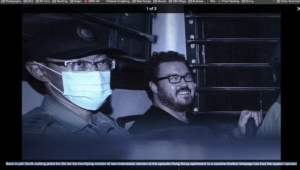C&N Coursework, Context & Narrative Blog, HNC Photography, Part 2: Narrative, Project 2: Image and Text
How captions can change the meaning
Exercise:
Cut out some pictures from a newspaper and write your own captions.
- How do the words you put next to the image contextualise/re-contextualise it?
- How many meanings can you give the same picture?
Try the same exercise for both anchoring and relaying.
While I’m not a fan (as a general rule) titling or captioning my own photographs, I do understand the importance of when it attached to a news story. In the context of a news story, the caption is there to point the reader in the editorial direction, to contextualise the image, and to clarify the narrative of the image.
As aspiring street photographers, we (or is just me?) tend to avoid telling the viewer what they should be seeing – because If we have to tell the view what is is the image is strong enough – or so say the members of a Hong Kong Street Photographers facebook group. Newspapers and Magazines are not Facebook groups, they are there to serve the public by reporting news – in their own style and from there own editorial/ political point of view.
Living outside of the UK for over 9 years I find it fascinating to look at UK newspaper and the degree that they are in general very sensational and very celebrity scandal orientated. So I have decided to go through today from a couple of the more popular tabloid newspaper websites – namely The Daily Mail and The Sun websites and pull a couple cutting to try and re-caption.
Originally this is a picture of Prince Harry’s fiance Meghan Markle with one of her friend who people are predicting to be a bridesmaid. However, it could just be a fashion shot or a holiday snap. I think the caption clearly anchors the viewer to what is the intended outcome – perhaps some people would recognise Meghan Markle, however, few would know the significance
Alternative captions could read:
Latest Fashions for cycling holidays.
This is shot originally of double murder Rurik Jutting being transported back to jail after his failed appeal in Hong Kong. Having lived in Hong Kong this is a notorious case Jutting is infamous for his despicable actions. However, I doubt he that well known outside HK, even in his native England, there for the caption is required to anchor the story for the view.
Sadly an alternative caption could be: “Smiling British expat transport to court/prison” which would not give an impression of the magnitude of his crimes and even suggest he is a victim.
This image is from The Sun and refers to Prime Minister Teresa May dealing with Europe and Brexit. The image of very generic of Mrs May perhaps showing a slightly angry face, therefore caption is anchoring us to the rejection of ideas in the story. However, it very generic it could show he reprimanding other ministers, it could show her a bad moment in mid-word there nothing to show definitely angry, I would this caption is also relaying a message.
Alternative captions can read: May chairs meaning of ministers or to keep the relaying idea “”Can you bring 2 coffees” says May as the meeting starts.”
Its very easy to recontextualise images and give alternative meaning – this has happened a lot on the Facepages of extreme political groups, for example, Britain First who mislead the public with a caption as reported in this Independent story.
References
Barthes, R. (n.d.). Rhetoric-of-the-image. [online] Faculty.georgetown.edu. Available at: https://faculty.georgetown.edu/irvinem/theory/Barthes-Rhetoric-of-the-image-ex.pdf [Accessed 10 Feb. 2018].
Mortimer, C. (2018). Britain First accused of using two schoolgirls for anti-Islam propaganda. [online] The Independent. Available at: http://www.independent.co.uk/news/uk/home-news/britain-first-told-to-take-down-facebook-images-of-cadet-schoolgirls-they-were-claiming-to-protect-a6726066.html [Accessed 10 Feb. 2018].
Traces Of The Real. (n.d.). The Rhetoric Of The Image – Roland Barthes (1964). [online] Available at: https://tracesofthereal.com/2009/12/21/the-rhetoric-of-the-image-roland-barthes-1977/ [Accessed 10 Feb. 2018].
Barthes, R. (n.d.). Death of the Author. [online] https://writing.upenn.edu. Available at: https://writing.upenn.edu/~taransky/Barthes.pdf [Accessed 10 Feb. 2018].



